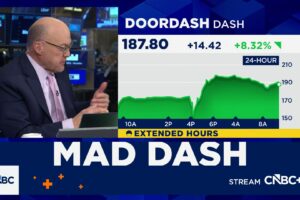
The Dow can go higher — and so can these great Dow stocks.
Happy belated anniversary, bull market. On Oct. 12, 2022, a new bull market began. Tech stocks led the charge then and are doing so now, fueled by surging demand for anything related to artificial intelligence (AI).
However, the venerable Dow Jones Industrial Average (^DJI 0.47%) is holding its own. The Dow is up close to 47% since the bull market began. Are there still some Dow stocks worth buying? Absolutely. Here are three unstoppable stocks to buy with the Dow at an all-time high.
1. Amazon
Amazon (AMZN -0.68%) is a relatively new member of the Dow Jones Industrial Average. The e-commerce and cloud-services giant replaced Walgreens Boots Alliance in February 2024. Amazon has been a great addition to the Dow so far, outperforming many other stocks in the index this year.
Perhaps the best indicator of Amazon’s strength is its rapidly improving free cash flow. The company generated free cash flow of $53 billion in the trailing 12 months ending June 30, 2024, compared with $7.9 billion for the trailing 12 months ending June 30, 2023.
Amazon’s cloud business, Amazon Web Services (AWS), continues to be the company’s most important growth driver. Organizations across the world are migrating to the cloud. AI, especially generative AI, is accelerating this trend. Amazon CEO Andy Jassy said in August that AWS remains “customers’ top choice” thanks largely to its broad functionality.
But Amazon is always looking for new ways to grow. The company has found one with advertising. In the second quarter of 2024, advertising-services revenue jumped 20% year over year excluding foreign exchange, slightly higher than AWS revenue growth. Jassy said in the Q2 earning call that Amazon is “at the very beginning of what’s possible in our video advertising.”
2. The Home Depot
The Home Depot (HD 0.85%) isn’t a newbie in the Dow like Amazon. The leading home improvement retailer joined the index on Nov. 1, 1999. Home Depot has more than quadrupled the Dow’s total return since then and has continued to outperform the index in 2024.
You might not think Home Depot looks unstoppable based on its Q2 results. The company’s revenue rose only 0.6% year over year and would have decreased by 3.3% if not for the acquisition of SRS Distribution. However, this temporary snapshot doesn’t tell the full story about Home Depot’s prospects.
Keep one number in mind with Home Depot: 42. That’s the median age of owner-occupied U.S. homes, according to Statista. With a large number of older houses, the demand for home improvement supplies should remain strong for years to come.
Home Depot also has another long-term tailwind. The U.S. continues to face a major housing shortage. Zillow estimates the country needs another 4.5 million homes. Home Depot should have a significant opportunity providing materials to professionals building new homes over the next decade and beyond.
3. Visa
Visa (V 1.02%) joined the Dow Jones Industrial Average on Sept. 23, 2013. The payments-technology company has nearly doubled the Dow’s total return since then.
Granted, Visa has lagged behind the Dow in 2024. This underperformance is due primarily to regulatory issues. In June, a federal judge rejected a settlement between Visa, Mastercard, and retailers over swipe fees. In September, the U.S. Justice Department filed an antitrust lawsuit alleging that Visa is monopolizing debit-network markets.
I’m not sure how these regulatory challenges will play out. However, Visa should remain a dominant force in the payments market regardless of the outcomes.
And that market should continue to grow. Cash is going the way of the dinosaurs as people increasingly use digital-payment methods. Visa could have an especially big growth opportunity as the middle classes expand in developing nations.
John Mackey, former CEO of Whole Foods Market, an Amazon subsidiary, is a member of The Motley Fool’s board of directors. Keith Speights has positions in Amazon and Mastercard. The Motley Fool has positions in and recommends Amazon, Home Depot, Mastercard, Visa, and Zillow Group. The Motley Fool recommends the following options: long January 2025 $370 calls on Mastercard and short January 2025 $380 calls on Mastercard. The Motley Fool has a disclosure policy.











